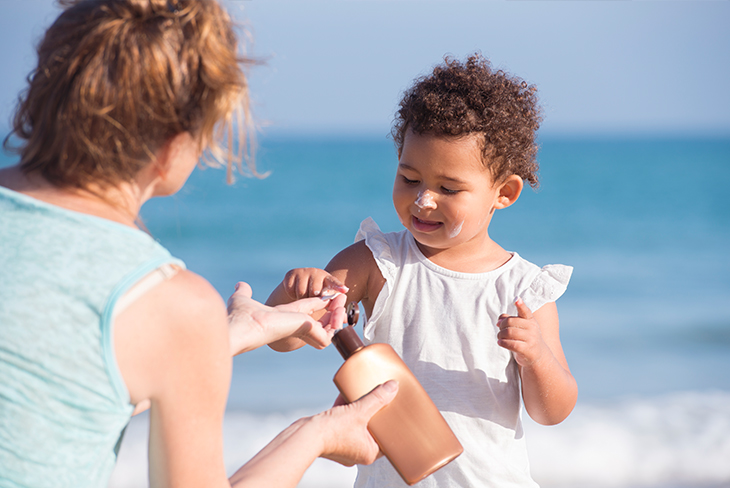Sun-safety tips

Sun exposure is the most preventable risk factor for all skin cancers, including melanoma. Here’s how you can be sun-safe.
It’s the summer holiday, so there’s a good chance your plans include a lot of sunshine. We all need some sun exposure in order for our bodies to produce vitamin D, but the sun carries one real danger: exposure to its ultraviolet (UV) rays increases your risk of skin cancer.
In 2010, the Cancer Association of South Africa published statistics indicating that skin cancer is the most common cancer in South Africa, with about 20,000 reported cases every year and 700 deaths. South Africa also has the second-highest incidence of skin cancer in the world after Australia, so clearly South Africans aren’t protecting themselves adequately in the sun.
‘The simplest thing to remember about skin cancer and sun exposure is that skin that changes colour is usually in trouble,’ says Dr Noufal Raboobee, dermatologist at Life Westville Hospital in Durban. ‘There is no such thing as a safe tan or protective tan – tanned skin is damaged skin. And it doesn’t matter whether you tan in the sun or on a sunbed, both increase your risk of skin cancer.’
Dr Raboobee says there are three main types of skin cancer (although there are other, less common ones too):
- Basal cell carcinoma: usually occurs on the sun-exposed areas of your body
- Squamous cell carcinoma: usually occurs on the sun-exposed areas of your body
- Melanoma: develops anywhere on your body, on otherwise normal skin or an existing mole that becomes cancerous
‘Skin cancer forms when there are mutations in the DNA of skin cells,’ he says. ‘The mutations cause the cells to grow out of control, and they form a mass of cancer cells. The origin of the cell giving rise to the cancer determines its type, as well as your treatment options.’
The key to skin cancer prevention is to act early – if you notice any changes to your skin that worry you, it’s best to err on the side of caution and see a dermatologist. Not all skin changes are caused by skin cancer, but it’s better to be safe.
‘Your dermatologist will look carefully at your skin to begin with,’ Dr Raboobee says, ‘but some further testing may be required. Usually, we do a biopsy, where we remove a sample of the suspicious skin for lab testing. This will tell us if it’s cancer or not. If we establish that it is cancer, total removal of the cancer is the main goal’.
Skin cancers like basal cell carcinoma rarely spread, so often the biopsy will remove the whole growth. But if you have a large squamous cell carcinoma or melanoma, your doctor may recommend further tests to determine the extent of the cancer. These could include testing nearby lymph nodes to see if the cancer has spread or not.
8 sun-protection tips
- Avoid the sun between 11am and 2pm, when the sun is at its strongest. Don’t forget that even in winter or on a cloudy day, UV radiation still filters through.
- Wear sunscreen every day of the year. Sunscreens aren’t perfect, but they do play a starring role in a good sun-protection programme.
- Use a broad-spectrum sunscreen with SPF 20 or more, and reapply often, especially if you’re swimming or perspiring. Don’t forget the sensitive areas like your lips, the tips of your ears, and the backs of your hands and neck.
- Wear protective clothing. Dark, tightly woven clothing that covers your arms and legs, and a broad-brimmed hat will provide the best sun protection.
- Look for sunglasses that block UVA and UVB radiation.
- Avoid tanning beds.
- Check your prescriptions. Be aware that some medicines, including antibiotics, can make your skin more sensitive to sunlight.
- Examine your own skin at least once a month, with the aid of mirrors, for any changes. Include your palms, the soles of your feet and spaces between your toes, your genital area and between your buttocks.
The information is shared on condition that readers will make their own determination, including seeking advice from a healthcare professional. E&OE. Life Healthcare Group Ltd does not accept any responsibility for any loss or damage suffered by the reader as a result of the information provided.

